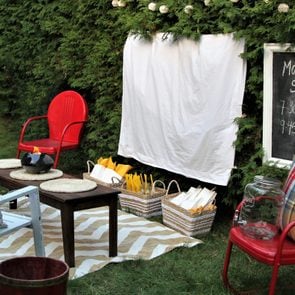4th of July Fireworks: A Complete Guide
Updated: Jan. 12, 2024

Everything you've ever wanted to know about fireworks, from their history to the proper way to use them to what makes them so bright.
One of the greatest highlights of every summer is the magic of 4th of July fireworks displays. The bright pops of color in the sky, paired with barbecues, all things red, white, and blue, plus friends and family, make for the perfect celebration. As you think about 4th of July getaways and other ideas for the 4th of July, you might ask yourself: What is the 4th of July, anyway? And which are the states where fireworks are legal? Maybe even, why are dogs scared of fireworks?
Before deciding on your holiday game plan, whether it’s going to see one of the best 4th of July fireworks displays in the country, or buying your own fireworks to set off at home, learn everything you need to know about fireworks for an amazing—and safe—celebration.
What is the significance of fireworks on July 4th?
Haven’t you always wondered why it’s a tradition to set off explosions of light in the sky on Independence Day? It’s certainly a day for celebration, but why fireworks? Well, the 4th of July’s history actually involves fireworks, and you can thank Founding Father John Adams for it.
During the first months of the Revolutionary War, after the 13 colonies had all voted in favor of independence from Great Britain, Congress began to write a declaration, which became the Declaration of Independence. Before it was even finished and signed, an enthusiastic John Adams wrote his wife a letter about how he thought the occasion of America’s freedom should be celebrated. It read:
“The Second Day of July 1776, will be the most memorable Epocha, in the History of America. I am apt to believe that it will be celebrated, by succeeding Generations, as the great anniversary Festival…It ought to be solemnized with Pomp and Parade, with Shews, Games, Sports, Guns, Bells, Bonfires and Illuminations from one End of this Continent to the other from this Time forward forever more.”
Adams was off by a few days, but the 4th of July was most certainly celebrated in a way he would have liked.
One year after the Declaration of Independence was signed, the first organized 4th of July fireworks were set off in 1777 in Pennsylvania and Boston (Adams’s hometown). The Pennsylvania Evening Post reported that “the evening was closed with the ring of bells, and at night there was a grand exhibition of fireworks (which began and concluded with 13 rockets) on the Commons, and the city was beautifully illuminated.”
Boston still has one of the most spectacular fireworks shows on the 4th, and its unique history definitely plays a part in that. In the years following, many more cities took part in July 4th celebrations that included speeches, parades, and picnics, in addition to fireworks.
Boston showed its love for the 4th again in 1783, when the city was the first to designate July 4th as an official holiday. Then, in the 1800s, as fireworks started to become available to the public, the sky became even more illuminated on the big day. And in 1870, Congress followed, making Independence Day a federal holiday. The bright colors and loud bangs are the perfect way to celebrate America’s freedom year after year.
Where to see the best fireworks on the 4th of July
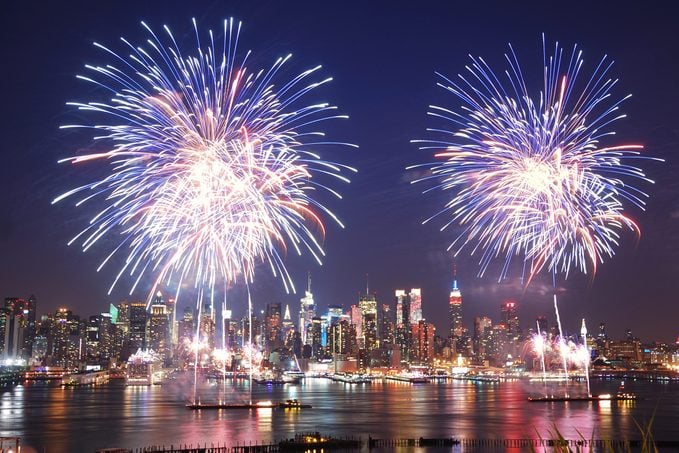
If you want to see a big 4th of July fireworks display this year, there are a few around the country that are sure to impress, whether you’re staying close to home or getting away for the weekend.
- New York City: Macy’s 4th of July Fireworks. Every year, the Big Apple puts on the largest fireworks show in the country, with thousands of fireworks set off from barges lining the East River, accompanied by music from the New York Pops Orchestra and Mormon Tabernacle Choir.
- Boston: Boston Pops Concert Fireworks Spectacular. Thousands gather along the Charles River in Boston for the city’s annual 4th of July spectacular, which kicks off at 8 p.m. with the national anthem and a patriotic sing-a-long, with the fireworks starting at 10:30 p.m.
- Philadelphia: Wawa Welcome America Festival. What better place to celebrate the 4th of July than right near the Liberty Bell and Independence Hall in Philadelphia? There’s a concert and parade during the day, and the fireworks start at 10:30 p.m. at the Philadelphia Museum of Art.
- St. Louis: Fair St. Louis Fourth of July Fireworks Spectacular. St. Louis celebrates with its traditional fireworks display over the Mississippi and the Gateway Arch, starting at 9:30 p.m.
- Washington, DC: A Capitol Fourth. If you’re in our nation’s capital for the 4th of July, check out the fireworks show launched from the Lincoln Memorial Reflecting Pool a little after 9 p.m. Watching the bright lights illuminate the sky behind the Washington Monument is truly a sight to see.
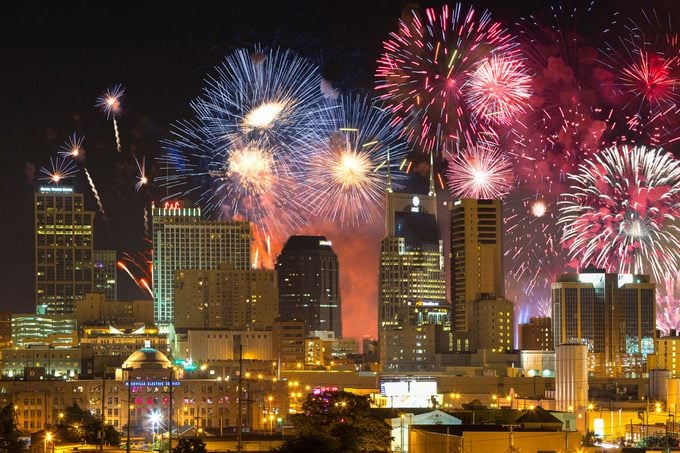
- Nashville: Let Freedom Sing! Organizers are making this July 4th celebration bigger than ever with the largest fireworks show in Nashville history. Along with the fireworks, there will be a synchronized performance by the Grammy-winning Nashville Symphony.
- Tampa: Boom by the Bay. Tampa will host a whopping six fireworks displays along its downtown waterfront, and before the big show (which will start around 9:15 p.m.), you’ll get to enjoy plenty of family-friendly activities, live entertainment, and a boat parade.
- Atlanta: The Fantastic Fourth Celebration. Atlanta doesn’t mess around when it comes to its 4th of July celebrations. You’ll be treated to a laser light show at dusk at Stone Mountain Park before the big fireworks display—just make sure to reserve a spot online beforehand.
- Houston: Freedom Over Texas. Everything really is bigger in Texas, and it’s proven with the annual fireworks, the largest land-based fireworks show in the U.S. The show is set off from Buffalo Bayou in Eleanor Tinsley Park, just west of Sabine Bridge and the downtown area.
- Las Vegas: Fireworks on the Strip. Step away from the slot machines (for at least a few minutes) for this massive patriotic display. This year, seven hotels on the Las Vegas Strip will coordinate fireworks displays starting at 11 p.m. Yes, it’s late, but remember, it’s Vegas.
Fireworks safety
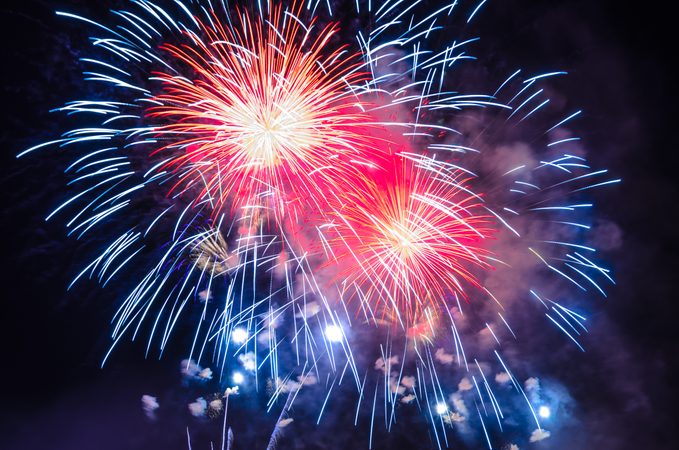
If you choose to forgo the big fireworks displays around the country and want to set off your own, know that fireworks are no joke. All fireworks and sparklers can be extremely dangerous. According to the 2021 Consumer Product Safety Commission (CPSC) fireworks safety report, there were an estimated 15,600 people treated in hospital emergency rooms for fireworks-related injuries in 2020—up from 10,000 in 2019—with 66 percent of them occurring around the 4th of July.
When it comes to fireworks safety, for starters, don’t set fireworks off near your house—and that includes off your deck. Instead, fireworks should be lit away from buildings and on a flat, level, hard, and fireproof surface, far away from debris like trash or vegetation that could catch on fire. Don’t light fireworks under power lines or near anything combustible, like a propane tank.
You’ll also want to plan for emergencies, just in case, by keeping a bucket full of water close by, along with a garden hose. Be sure to turn the faucet on and ensure the water is running to the hose so you can put out a fire immediately if need be.
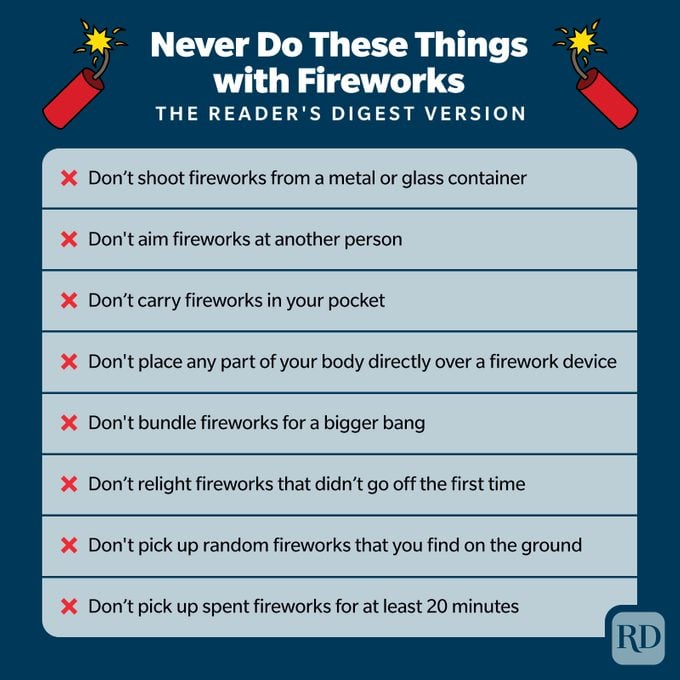
Have an adult supervise
The CPSC makes it pretty clear: Never allow young children to play with or ignite fireworks. Even sparklers, which kids have been waving around for hundreds of years, are quite dangerous—in fact, they were the cause of the second highest number of ER-treated fireworks injuries in 2020, with a whopping 900 treated injuries.
“Extreme care must be practiced when sparklers are used, and only under close adult supervision,” says Julie Heckman, executive director at American Pyrotechnics Association (APA). Ultimately, it’s a very pointy object that burns as hot as a blow torch—about 2,000 degrees Fahrenheit. Something that’s a lot safer? Having kids make fireworks-inspired 4th of July crafts.
Dress appropriately for the occasion
If you’re going to set off fireworks, don’t do it barefoot or with minimal protection. Heckman suggests closed-toe shoes, and you should also don safety glasses to protect your eyes, keep long hair pulled back, and avoid clothes with loose or hanging fabric that could catch fire. If possible, use a utility-style lighter for a safer distance between your arm and the fuse.
Be alert—and sober
Barbecues and beer go hand in hand on the 4th, but if you don’t want to get injured (or hurt someone else), don’t drink and set off fireworks. An incident in the CPSC report tells of a 61-year-old man who died after lighting a firework the wrong way, causing it to hit him in the chest. He had been drinking during the day, and police found many empty alcohol containers at the scene. Spectators, listen up: You should be careful when it comes to drinking alcohol around fireworks displays too. Also, never smoke while around fireworks.
Take care of your pets
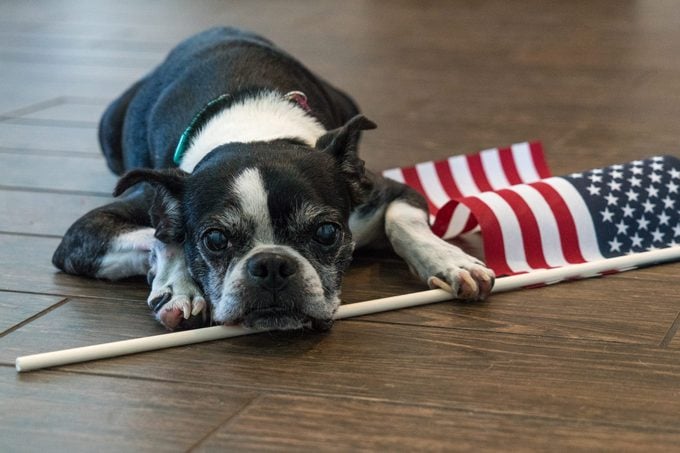
Keep your pets inside. Even if they aren’t afraid of the noise or lights, a dog’s or cat’s curiosity about the fireworks could get them hurt, or they could accidentally end up in the path of the fireworks. If your pup is especially anxious about fireworks, try the ThunderShirt for dog anxiety.
Check the weather beforehand
The weather is actually a significant factor in firework safety, and it’s not just rain that can dampen the festivities. Windy conditions aren’t safe for lighting fireworks because fireworks can tip over, or the wind could send them in the path of spectators or passersby. Always light fireworks with the prevailing wind blowing away from the spectators.
Keep a safe distance from fireworks
Spectators should be watching 4th of July fireworks from a safe distance. Heckman says for fountain and cone fireworks, spectators should be at least 25 feet away, and for aerial fireworks, at least 40 feet away. Remember: Each state and municipality has specific laws regarding fireworks, so make sure to read up on the specifics ahead of time.
Never do these things with fireworks
You know what they say about an ounce of prevention. These tiny tips can go a long way in warding off ER visits—or worse.
- Don’t shoot fireworks from a metal or glass container.
- Never aim them at another person.
- Don’t carry them in your pocket.
- Never place any part of your body directly over a firework device.
- Never bundle fireworks for a bigger bang. It might be tempting to combine fireworks or take them apart to make your own creation, but the CPSC strongly advises against this.
- Don’t relight a firework that didn’t go off the first time; it still could go off and explode.
- If you see a firework on the ground, leave it. There’s no telling why it’s on the ground. Report it to the police or the fire department. If you’re a parent, be sure to warn your kids of this danger.
- Don’t be in a rush to pick up spent fireworks. Let them stand for at least 20 minutes before you pick them up or you could get burned. Next, submerge all the fireworks in a bucket of water and let them soak overnight. (The same goes for duds, but to be extra safe, scoop them up with a shovel and then submerge them in water.) Once you follow those steps, you can place the soaked fireworks in a trash bag and dispose of them with your other household trash.
Where are fireworks legal?
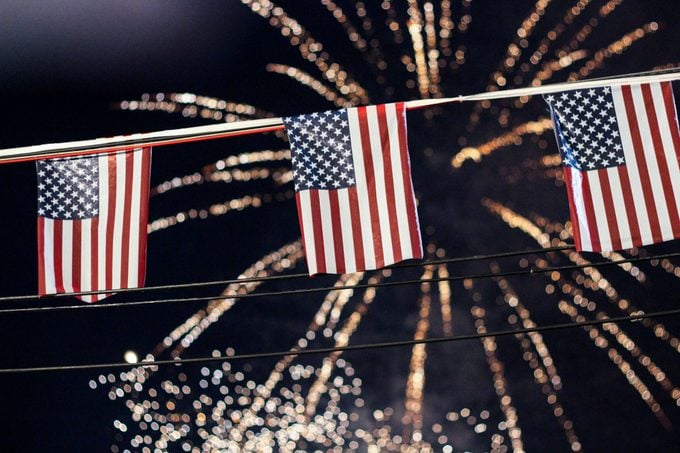
Because of the risks that come along with setting off fireworks, many states have strict regulations for them. The only state that completely bans all consumer fireworks is Massachusetts. The remaining 49 states and Washington, DC, allow consumer fireworks in some form. The restrictions vary from state to state, though, so before buying and setting off 4th of July fireworks, make sure to look up your local laws. You can learn more about what types of fireworks are legal and illegal here.
Where to buy fireworks
Where you can buy fireworks depends on where you live. If you’re looking for something small, like sparklers, those can typically be found at your local department or grocery store. Larger fireworks are typically sold from firework stores, online, or from roadside stands that start to pop up around the 4th.
Before purchasing any fireworks, read up on your local laws and the safety tips noted above. Too worried about the dangers of fireworks to attempt an at-home display? Try these 4th of July games the whole family will love instead.
Fun facts about fireworks
Those 4th of July fireworks displays look a lot like magic, but they actually entail a lot of science and some very specific planning. Here’s how it all works:
- It’s amazing how a firework can end up looking like a chrysanthemum or smiley face when it has only three main components: an oxidizer, a fuel, and a chemical mixture to produce the color. The ingredients are placed in a small tube called an aerial shell; the explosive materials are called stars, and they form the colorful spheres, cubes, cylinders, and other shapes that explode into complex designs.
- To get fireworks into the air, the aerial shells are placed in a tube called a mortar. Fireworks staff light a fast-acting fuse below the shell that contains gunpowder, and the gunpowder explodes, creating a buildup of heat, gas, and a whole lot of pressure. When the pressure reaches critical mass, off it goes up into the sky, and once the shell is high off the ground, another fuse inside the aerial shell that’s on a time delay ignites, causing the bursting charge to explode and light up.
- Brilliant, glowing colors come from different metal elements—when the chemicals in fireworks burn, energy is released in the form of light. The chemicals burn in different wavelengths of light depending on the metal element.
- After a firework expends itself, the remaining debris is biodegradable paper and a small amount of carbon.
Now that you know all about fireworks, there’s just one thing left to do: Find the perfect 4th of July captions for your fireworks photos and all your other patriotic pics!
Sources:
- Massachusetts Historical Society: “Letter from John Adams to Abigail Adams, 3 July 1776, ‘Had a Declaration…'”
- The Pennsylvania Magazine of History and Biography: Volume 35
- History.com: “Fourth of July—Independence Day”
- Julie Heckman, executive director at the American Pyrotechnics Association
- U.S. Consumer Product Safety Commission: “Fireworks-Related Deaths, Emergency Department-Treated Injuries, and Enforcement Activities During 2020”






















